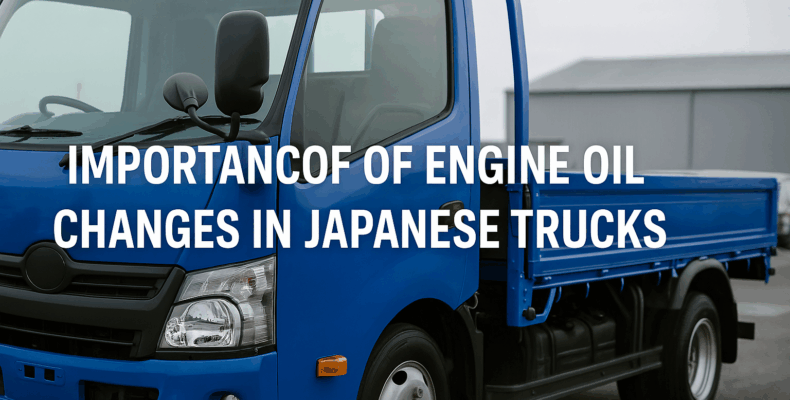Importance of Engine Oil Changes in Japanese Trucks
Japanese trucks are globally recognized for their long-lasting performance, high efficiency, and exceptional engineering. However, even the most reliable trucks need regular maintenance—especially engine oil changes. Skipping or delaying oil changes can lead to costly repairs and decreased fuel efficiency, ultimately reducing your truck’s lifespan.
In this article, we’ll explore why engine oil changes matter, how often you should perform them, and how proper maintenance helps maximize your investment—especially when buying from Japan.
What Does Engine Oil Actually Do?
Before diving into schedules and tips, it’s important to understand the purpose of engine oil. It plays several critical roles:
-
Lubricates engine components to reduce friction
-
Cools engine parts and prevents overheating
-
Cleans the engine by removing metal particles and dirt
-
Protects against corrosion and sludge buildup
Without fresh oil, your engine works harder, gets hotter, and wears down faster. Over time, this leads to poor performance and unexpected breakdowns.
Top Reasons to Change Engine Oil Regularly
Let’s break down the benefits of consistent oil changes:
🔧 1. Boosts Engine Life
Old oil becomes thick and dirty. Therefore, it can’t flow easily or protect engine parts. Replacing it keeps the engine running smoothly, especially during long-haul operations.
⛽ 2. Improves Fuel Efficiency
Fresh oil allows your engine to move freely. As a result, it burns less fuel. For businesses, this means lower operating costs over time.
💥 3. Prevents Engine Damage
Oil that isn’t changed on time may turn into sludge. This can block oil passages and lead to catastrophic engine failure. Timely oil changes eliminate that risk.
📉 4. Reduces Repair Costs
Changing oil is affordable. Replacing engines or turbochargers isn’t. Regular oil changes reduce the chance of expensive repairs by protecting key systems.
🚛 5. Increases Truck Resale Value
A well-maintained service history increases resale value. Used truck buyers always prefer vehicles with consistent maintenance records—especially those exported from Japan.
How Often Should You Change Engine Oil?
There’s no one-size-fits-all answer. However, here are general guidelines for Japanese diesel trucks:
| Truck Use Case | Recommended Interval |
|---|---|
| Urban Delivery | Every 5,000–7,000 km |
| Long-Haul Transport | Every 7,000–10,000 km |
| Harsh Environment Use | Every 4,000–5,000 km |
Also, change the oil filter with every oil change to ensure maximum protection.
Signs Your Truck Needs an Oil Change
Sometimes your truck will give warning signs. Look out for:
-
Dark or gritty oil on the dipstick
-
Strange engine noises or vibrations
-
Warning lights on the dashboard
-
Decreased fuel economy
-
Engine running hotter than usual
If you notice these, don’t delay—schedule an oil change immediately.
Best Japanese Trucks with Reliable Engine Performance
Some Japanese trucks are known for their oil-efficient and durable engines. Here are great options to consider:
| Model | Known For |
|---|---|
| Isuzu Elf | Compact, fuel-efficient diesel |
| Hino Dutro | Smooth engine response |
| Mitsubishi Canter | Durable with turbo-diesel options |
| Toyota Dyna | Great for city logistics |
| Nissan Atlas | Balanced performance and cost |
You can find these at competitive prices by sourcing from professional exporters.
👉 Top 5 Trusted Japanese Used Truck Exporters for Global Buyers
Tips for Maintaining Engine Oil Health
To keep your truck running like new:
-
Always use the correct oil grade recommended by the manufacturer
-
Avoid mixing different oil types
-
Stick to a scheduled maintenance plan
-
Check oil levels regularly between changes
-
Choose high-quality oil and filters
These small steps protect your truck’s biggest asset—its engine.
Final Thoughts: Small Maintenance, Big Rewards
In conclusion, regular engine oil changes may seem like a minor task, but they have a massive impact on your truck’s health, performance, and value. Especially for used Japanese trucks, proper maintenance ensures you get the best out of your vehicle for years to come.
If you’re looking to purchase a truck that’s been well-maintained and ready for work, start with exporters who value quality and reliability.
👉 Top 5 Trusted Japanese Used Truck Exporters for Global Buyers
